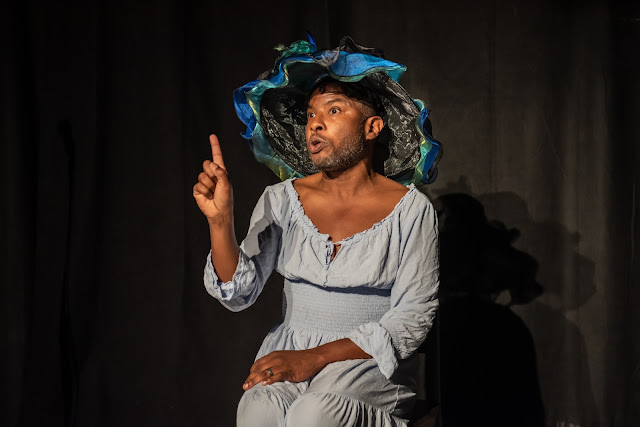The Real Black Swann: Confessions of America’s First Black Drag Queen
Presented by FRIGID New York at the Kraine Theater
85 E 4th St., Manhattan, NYC and via livestream
June 18, 19, and 24, 2023
 |
| Les Kurkendaal-Barrett. Courtesy of Emily Owens PR |
Pride month means that it's once again time for the annual Queerly Festival, presented by FRIGID New York at the Kraine Theater and UNDER St. Marks from June 15th through July 3rd. The 2023 edition of the festival, founded in 2014, features a full slate of plays, storytelling, comedy, drag, and more (visit
FRIGID New York for the full schedule). Writer, actor,
podcaster, and storyteller Les Kurkendaal-Barrett joins this year's celebration of queer artists with his award-winning solo show
The Real Black Swann: Confessions of America’s First Black Drag Queen, which illuminatingly interweaves episodes from Kurkendaal-Barrett's own life with the story of former slave, "queen of drag," and first queer activist on record William Dorsey Swann.Launching into the show with immediately riveting energy, Kurkendaal-Barrett quickly introduces the image of the self-protective big pink Glinda-the-Good-Witch bubble with which he had become accustomed to surrounding himself as a gay, Black man living in the United States. The coincidental intersection of George Floyd's murder and BLM protests with both an article about Swann being brought to Kurkendaal-Barrett's attention and a medical procedure requiring anesthesia results in Kurkendaal-Barrett meeting Swann, who goes by the Queen, in a dream. What follows owes a structural inspiration, acknowledged by the show in a funny sequence, to
A Christmas Carol, with Swann functioning like the Ghost of Christmas Past while she challenges Kurkendaal-Barrett's protective bubble and talks about her own experience, from being born into slavery in Maryland around 1858, to discovering drag (the segment in which a dress literally calls to him to try it on is first humorous and then quietly transformative), hosting successful parties for queer men, and, of course, multiple conflicts with the legal system. Interspersed with this, she causes Kurkendaal-Barrett to relive selected memories, from racist harassment as a schoolchild to harassment by the racist policing system and racist neighbors ("you don't look like you belong here” becomes a refrain, and his ticketing by police comes to seem like a tax of being Black). Meeting Swann pushes Kurkendaal-Barrett, and the audience, to think about fear, resistance, and empowerment–which can sometimes come from wearing a dress even when doing so is illegal–and how much what he and Swann face as queer Black Americans has
not changed in a century or more.
 |
| Les Kurkendaal-Barrett. Courtesy of Emily Owens PR |
Kurkendaal-Barrett is a vivid and vigorous storyteller, and he establishes the Queen as a distinct voice throughout the intertwining narratives. Near the end, Kurkendaal-Barrett steps outside of both these narratives for a meta discussion of how the show came to be and how little historical information is available on Swann (he cites, for instance, widely disparate dates for the basic fact of Swann's death; happily,
an article published just over a week ago does note that a book on Swann is forthcoming). He also reminds the audience, especially the white audience, that being "sick" of hearing about racism and homophobia is not an option and that in a climate of increasingly open white supremacy and regressively increasing attacks on queer people, including the organized demonization and (re)criminalization of drag, we need to fight back while we still can. The added urgency of the show's timeliness, though, is only one more on a list of reasons to see
The Real Black Swann, a list that is as long as a floor-length silk gown.
-John R. Ziegler and Leah Richards





Comments
Post a Comment